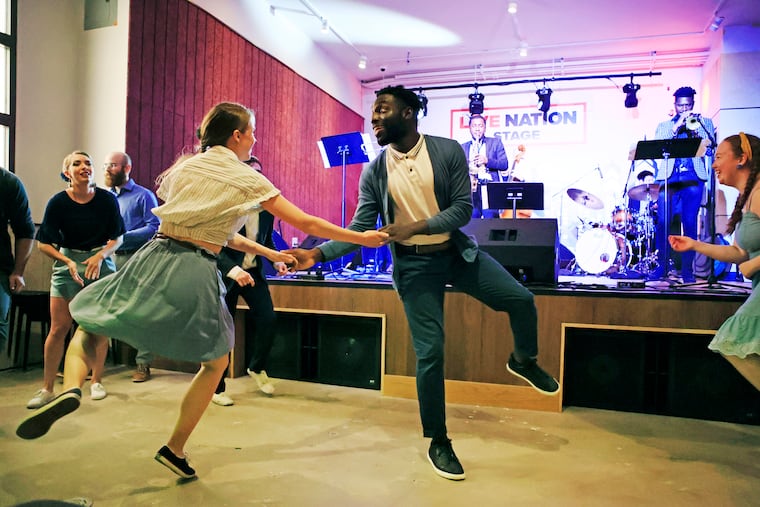‘No more starving artist’: Black Music City grant recipients reveal their work on Juneteenth
Twenty-three artists received grants ranging from $1,000 to $3,500 to create new work that recognizes or is inspired by Philly’s Black music history.

You’ve probably never heard of Frank Thurmond Fairfax, an influential Philadelphia jazz bandleader and union organizer for Black musicians in the 1930s.
Joshua Lee, an accomplished jazz saxophonist from South Philadelphia, has set out to change that — with a seven-piece band and a $2,000 grant from the Black Music City project.
On Saturday — Juneteenth — at REC Philly, the coworking space for Philly creatives, Lee’s band performed a new arrangement based on one of Fairfax’s lead sheets — basically the melody and chord changes — that he obtained from the late musician’s son.
“It’s something we didn’t learn in school. And I went to school for music,” Lee, 26, a Temple University graduate, said of Fairfax. Lee said Fairfax is sometimes overlooked in Philadelphia jazz history because he didn’t record music, thinking it would make him obsolete.
“One of the greatest jazz stars ever, Dizzy Gillespie, played in his band in Philly before he became famous,” Lee said.
Lee, who tours with the Count Basie Orchestra, is one of 23 artists who received grants ranging from $1,000 to $3,500 to create new work that recognizes or is inspired by Philly’s Black music history.
Black Music City is a collaboration between radio stations WXPN and WRTI and REC Philly, with $48,000 in funding provided by the Wyncote Foundation, Tito’s Vodka, and Philadelphia residents Dan and Marilyn Hauser.
Several artists performed or had their work on display during the livestreamed event at the Fashion District, which took place during Black Music Appreciation Month and on the day that was was established this past week as a federal holiday commemorating the emancipation of the enslaved.
Bill Johnson, general manager of WRTI, received loud applause when he mentioned that the event coincided with Juneteenth, describing music as “a defining element of the Black American experience.”
“It’s an opportunity to reflect upon the contributions of Black America to the America — the American story. Not the Black American story, but the American story,” Johnson said. “Because it is woven into the fabric of everything that we enjoy, everything we look at and are a part of, it’s woven in there. It’s an opportunity to say, ‘We are going to face the truth.’ ”
Roger LaMay, general manager of WXPN, said the grant program is sorely needed to boost Black artists in the area and connect them with a wider audience.
“The arts and artists, it’s a known fact, are underfunded in this region,” LaMay said. “In particular, Black artists don’t have the access to the funding in this region.”
LaMay said he was floored by the talent pool. More than 600 people applied for the grants.
“When we got down to the final 23, we literally — we were on Zoom —looked at each other and went, ‘Oh my goodness, this is incredible,’ the quality and the caliber of the people that are getting these grants,” he said.
Other artists whose work was featured Saturday included Aniyah Munroe, whose “Before Me” images honored Philadelphia musicians such as Marian Anderson within an Afrofuturist landscape, and Erin Dillard, a.k.a. Emospacebird, who created a song and video paying tribute to Sister Rosetta Tharpe.
They also received a bit of practical advice through a taped interview with Kenny Gamble. He cautioned that the music industry can be tough to break into, but urged them to keep pushing.
“They used to say, ‘Kenny, you ain’t gonna make it, man,’ ” said Gamble, who with Leon Huff and their Philadelphia International Records are credited with creating Philadelphia’s soul music genre, known as the “Sound of Philadelphia.”
Later, Gamble added: “Sometimes, it can bring you down when people say you ain’t gonna make it. You have to stick with it. … You do the best you can and you keep rolling. Nothing’s promised to you in this business. You just got to keep on and be yourself and follow your own dreams.”
Animah Danquah, a grant recipient from West Philadelphia, created a series of photographs at recognizable locations around the city, including FDR Park, that reference artists such as Teddy Pendergrass, Eve, and Lil Uzi Vert.
“I think it’s important to not only honor the past musicians, but take into consideration the people who are making sounds now that were inspired by the past,” Danquah said.
She said the outside funding through Black Music City was helpful, and hoped that it would continue.
“As a creative, we often are in positions where we do things for the ‘exposure’ or to meet others,” Danquah said, “but to be in a position to do what you love, receive the money for it, and then pay it forward to other individuals, that’s something that I want to do more of.”
Perhaps Scarlet Estelle Hernandez, REC Philly’s director of member success, summed it up best.
“We are here to support artists in their endeavor of making money doing what they love,” Hernandez told the audience. “No more starving artist.”
Fill out this survey to share your thoughts on the Broke in Philly project.
The Philadelphia Inquirer is one of more than 20 news organizations producing Broke in Philly, a collaborative reporting project on solutions to poverty and the city’s push toward economic justice. See all of our reporting at brokeinphilly.org.